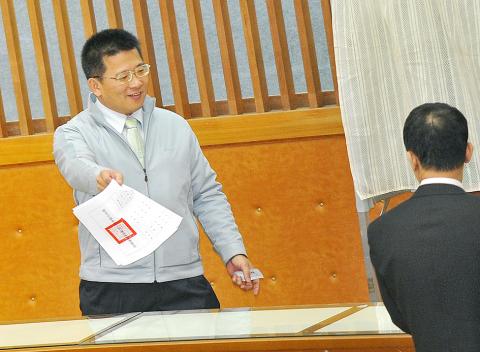In a landmark ruling that is expected to have wide political ramifications, the Taiwan High Court handed down a “not guilty” verdict to 10 then-New Taipei City councilors who “flashed ballots” to show observers their votes in the city council’s 2010 speaker election.
The ruling upheld the decision by the New Taipei City District Court in May last year, which found the 10 Democratic Progressive Party (DPP) councilors, including Lee Wan-yu (李婉鈺) and Sheng Fa-hui (沈發惠), who were charged with disclosure of state secrets and related offenses arising from the case, not guilty.
Yesterday’s ruling is seen by senior DPP officials and some civic groups as a positive development, as they have long advocated for changes to institute “recorded voting,” or “roll call voting,” instead of the current “secret ballots” in local councils.

Photo: Liu Hsin-de, Taipei Times
They see “recorded voting” as a better political reform measure to counter potential bribery and vote-buying, and to monitor councilors who vote against the majority of their constituents’ wishes.
The High Court ruling states that city and county council speakers and deputy speakers have job functions that entail important political and administrative policies, and previous court decisions cited Article 132 of the Criminal Code, which covers public officials’ disclosure of documents or information of a secret nature on matters outside of national defense.
In this decision, the judges said that in the case of the election of speaker and deputy speaker by councilors, the voting and balloting process in itself is not concerned with national political and administrative policies, and as such, the “ballot flashing” was not in violation of Article 132, and therefore the councilors were found not guilty.
The decision is final and cannot be appealed.
Following the High Court’s decision, Supreme Prosecutors’ Office Prosecutor-General Yen Ta-ho (顏大和) cited the different rulings between the 2010 council speaker election in Greater Kaohsiung and the then-Taichung City election in 1994.
Yen said he would make an “extraordinary appeal” to the Supreme Court on the not-guilty ruling in the “ballot flashing” case of Greater Kaohsiung councilors in the 2010 council speaker election, because he noted the court found Taichung City councilors guilty in a similar situation in 1994.
DPP spokesperson Huang Di-ying (黃帝穎) and legal counsel Wellington Koo (顧立雄) urged the judiciary to focus on bribery and vote-buying in local council elections, and to not waste resources going after councilors who cast the ballots.

Conflict with Taiwan could leave China with “massive economic disruption, catastrophic military losses, significant social unrest, and devastating sanctions,” a US think tank said in a report released on Monday. The German Marshall Fund released a report titled If China Attacks Taiwan: The Consequences for China of “Minor Conflict” and “Major War” Scenarios. The report details the “massive” economic, military, social and international costs to China in the event of a minor conflict or major war with Taiwan, estimating that the Chinese People’s Liberation Army (PLA) could sustain losses of more than half of its active-duty ground forces, including 100,000 troops. Understanding Chinese

The Ministry of Foreign Affairs (MOFA) yesterday said it is closely monitoring developments in Venezuela, and would continue to cooperate with democratic allies and work together for regional and global security, stability, and prosperity. The remarks came after the US on Saturday launched a series of airstrikes in Venezuela and kidnapped Venezuelan President Nicolas Maduro, who was later flown to New York along with his wife. The pair face US charges related to drug trafficking and alleged cooperation with gangs designated as terrorist organizations. Maduro has denied the allegations. The ministry said that it is closely monitoring the political and economic situation

UNRELENTING: China attempted cyberattacks on Taiwan’s critical infrastructure 2.63 million times per day last year, up from 1.23 million in 2023, the NSB said China’s cyberarmy has long engaged in cyberattacks against Taiwan’s critical infrastructure, employing diverse and evolving tactics, the National Security Bureau (NSB) said yesterday, adding that cyberattacks on critical energy infrastructure last year increased 10-fold compared with the previous year. The NSB yesterday released a report titled Analysis on China’s Cyber Threats to Taiwan’s Critical Infrastructure in 2025, outlining the number of cyberattacks, major tactics and hacker groups. Taiwan’s national intelligence community identified a large number of cybersecurity incidents last year, the bureau said in a statement. China’s cyberarmy last year launched an average of 2.63 million intrusion attempts per day targeting Taiwan’s critical

AGING: As of last month, people aged 65 or older accounted for 20.06 percent of the total population and the number of couples who got married fell by 18,685 from 2024 Taiwan has surpassed South Korea as the country least willing to have children, with an annual crude birthrate of 4.62 per 1,000 people, Ministry of the Interior data showed yesterday. The nation was previously ranked the second-lowest country in terms of total fertility rate, or the average number of children a woman has in her lifetime. However, South Korea’s fertility rate began to recover from 2023, with total fertility rate rising from 0.72 and estimated to reach 0.82 to 0.85 by last year, and the crude birthrate projected at 6.7 per 1,000 people. Japan’s crude birthrate was projected to fall below six,